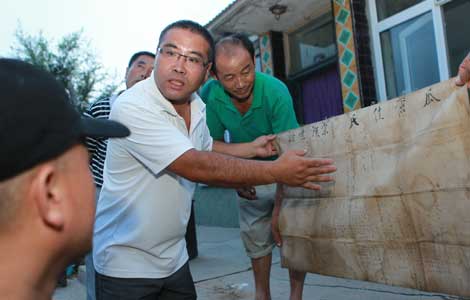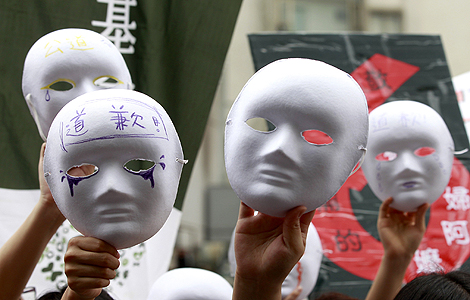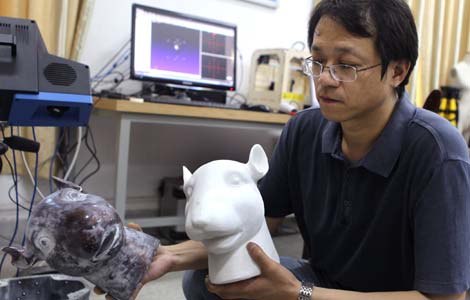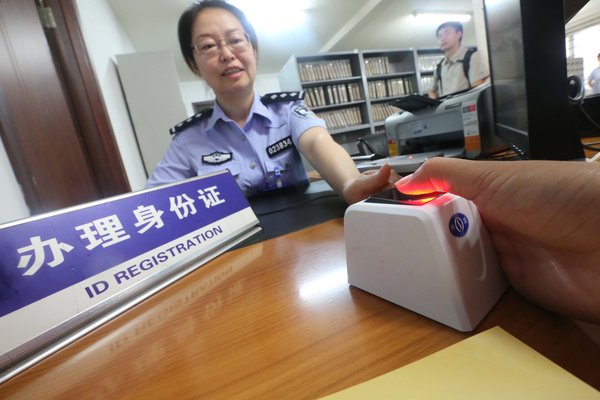Efforts stepped up to curb fraudulent ID card use
Updated: 2013-08-15 07:46
By Cao Yin (China Daily)
|
||||||||
Authorities to continue gathering fingerprints to reduce crime
The Ministry of Public Security announced on Wednesday that it will increase efforts to stop criminals using lost or stolen ID cards to make purchases or conduct other illegal business.
It said it would step up efforts to catch criminals involved in such activities and also continue its program of recording fingerprints on ID cards, thus making fraudulent use more difficult.
The ministry's statement was made amid growing public concern over the use of lost and stolen ID cards to open bank accounts, launder money, make payments and purchases or transfer funds between accounts.
The ministry said that more than 16,000 police stations are involved in registering fingerprint information on ID cards, and that the work would be extended across the country by the end of the year.
It also said it is setting up a system for reporting lost ID cards, and called on banks and other institutions to be careful to check the identities of all ID card holders before proceeding with any transactions.
Since 2004, China has been issuing second-generation ID cards, which have digital anti-forgery technology, and around 1.2 billion people now have the cards, according to the ministry. First-generation ID cards, which lacked digital technology, have been obsolete since Jan 1.
The anti-forgery technology on second-generation cards has made it difficult for criminal gangs to produce fake cards, but it has not prevented them from finding other ways of using lost or stolen cards.
For example, it is not possible to cancel a card that has been lost or stolen, as there is no central system for recording such information, which means criminals have been free to use them again.
Among those concerned about ID card security is Zhao Huijin, who reported the loss of her identity card to police last month.
"I was shocked when I learned recently that people had sold other people's ID cards online, using them to open bank accounts or even launder money," said the 26-year-old, who works at a financial company in Beijing.
"It would be dangerous if my personal information in the card could not be canceled, and it would be horrible if another person were to use my identity," she said, adding that she was still not sure whether her lost card was in safe hands.
Experts said the increasing use of fingerprint technology offers some hope of improved security, since it will offer a new method for banks and other institutions to check the card-holder's identity. However, the system is still in the early stages, and many feel it will not offer a complete solution.
According to the Chinese Resident Identity Cards Law, which took effect in January 2012, allows citizens who apply for, change or replace their ID cards to supply their fingerprint information for inclusion in the card.
But Liu Xiaohang, an employee in an investment company in Beijing, said that the introduction of fingerprinting technology will not stop him worrying about security. He said that some banks and other institutions are not strict in applying security rules and often accept a copy of an ID card - rather than the original - as proof of a person's identity.
For this reason, the 25-year-old is very careful when anyone asks him to supply a copy of his ID card, since he know that it could be misused. He makes sure that any copies are destroyed if they are not needed.
"After all, not all businesses have the system or devices necessary to identify citizens' fingerprints," he added.
Luo Yaping, a fingerprint expert at the People's Public Security University of China, said the key issue lies in ensuring information on old or lost cards cannot be used and that the cards are destroyed when people are issued new ones.
"The fingerprints can help police, institutions and citizens be sure of the cardholder's identity, but that doesn't mean it can root out forged cards," she said. "It's also not practical to ask all departments to install fingerprint devices."
She suggested that institutions should eventually share the recorded fingerprint data, "which can reduce forgery to some extent," she added.

 Two killed in fiery crash of UPS cargo jet
Two killed in fiery crash of UPS cargo jet
 Special bus seat for breast-feeding mothers
Special bus seat for breast-feeding mothers
 Northern exposure
Northern exposure
 Re-enacting ancestors' journey to the west
Re-enacting ancestors' journey to the west
 Yao dreams of sports for fun with towering charity
Yao dreams of sports for fun with towering charity
 Protests arise in Taiwan over 'comfort women'
Protests arise in Taiwan over 'comfort women'
 Huawei unveil Ascend P6 smartphone in Vienna
Huawei unveil Ascend P6 smartphone in Vienna
 When small is beautiful in hotel industry
When small is beautiful in hotel industry
Most Viewed
Editor's Picks

|

|

|

|

|

|
Today's Top News
Abe rules out visit to Yasukuni shrine
Manning 'sorry' for US secrets breach
Snowden case not to affect US-Russia talks
Over 200 dead after Egypt forces crush protesters
2 killed in crash of UPS cargo jet
China to probe foreign automakers
Watchdog to protect rights of consumers
Sizzling summer tops the record list
US Weekly

|

|






